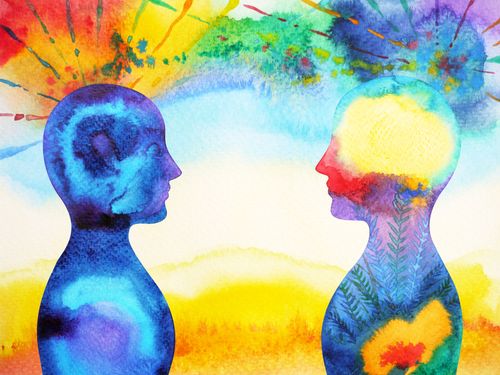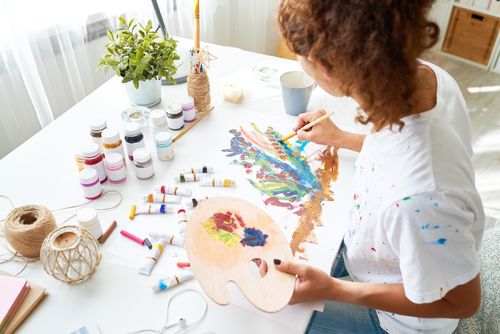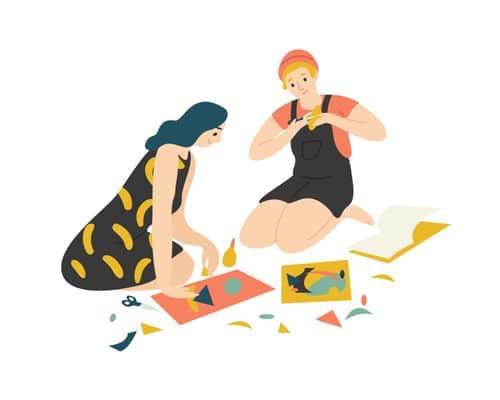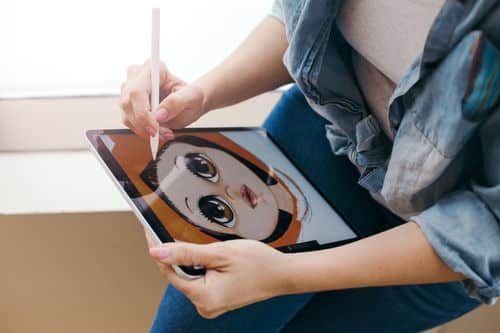What is Art Therapy and How Does it Help?
S Sharanya
July 4, 2025
S Sharanya
July 4, 2025
Look around you. There is an art in everything, but how often do you actually pause to take a long look at it? In our busy lives, art and aesthetics generally take a back seat, and we often forget to appreciate the beauty of it. Art, both creating and admiring it, has also been scientifically proven to help with stress. It works as an excellent coping mechanism for many who struggle with negative emotions. Perhaps this is why art therapy is becoming increasingly popular with people from all generations. In this article, we will take you through all that you need to know about the practice.

Noted illustrator George E. Miller once said, “Creating artwork allows your mind to be in a safe place while it contemplates the tougher issues you are dealing with. One can use the tools of brush, paint, pastels, crayons, etc. to expose and even for a short time color those issues in a different light.”
Drawing from that passage, which emphasizes the act of creating as cathartic in itself, one can look at art therapy as a form of self-expression that promotes healing and positive coping mechanisms. It is facilitated by a trained expert in both art and psychology to promote the patients’ mental, physical, and emotional well-being.
The American Association of Art Therapy defines it as: “Art therapy is the therapeutic use of art-making, within a professional relationship, by people who experience illness, trauma or challenges in living, and by people who seek personal development.”
Most mental health advocates maintain that therapy is for everyone and that anyone who takes therapy stands to benefit from it. Similarly, art therapy does not come with an instruction manual prescribing an ideal subject that needs it. It can be facilitated to any and every individual out there, but some might stand to benefit more than others based on their pre-existing conditions and specific experiences.
Art therapy can be availed by individuals or groups and even whole communities. It does not require one to one interaction and can be easily administered in a group. Usually, those who find it difficult to express themselves are often recommended to seek out art therapy. Following is a list of people who could particularly benefit from art therapy:
The world around us is increasingly stress-inducing, especially since we live in the age of social media. Art therapy helps people healthily cope with stress. It allows them to blow off steam and find some sort of release through art. Particularly those who find it hard to talk in therapy can opt for art therapy as an alternative form of self-expression and opening up.
Many studies have looked into the impact of art therapy on those suffering from anxiety/depression and other severe mental disorders. The results speak highly of art therapy and its efficacy in helping individuals with mental health problems. Art therapy provides an opportunity for a healthy emotional release in a controlled environment. Your therapist can draw out complex emotions and feelings that you otherwise would be unwilling to share or unaware of. By creating something new, you can process these feelings and try to overcome your mental health hurdles.
Art therapy is often recommended to those struggling with academics and/or have learning disabilities. It is a psychotherapeutic service that positively impacts children’s sensorimotor skills and helps develop their cognitive abilities. Children with Autism or ADHD, in particular, can severely benefit from this practice since it improves their coping skills and their self-confidence.
Any traumatic incident in an individual’s life has lasting effects on their mental health. In some extreme cases, victims of severe trauma retreat into a shell and cannot talk about their trauma or process those feelings. This might hamper their social skills, relationships with other people, and their own physical and mental health. Art therapy is an excellent psychotherapeutic tool to help those with Post Traumatic Stress Disorder process their feelings. Survivors of sexual abuse, war veterans, and others living with PTSD can benefit greatly from art therapy.
A person can learn a lot about themselves in art therapy. What they create, what they express, what they admire, reflects who they are, and what goes on in the depths of their mind. So if you are feeling all over the place or want to discover yourself in greater clarity, art therapy can help you understand yourself and express your feelings.
Art therapy can take multiple forms, but here are some of the most popular and commonly used forms of art therapy:

You do not need to be an expert painter to be part of a painting session during your art therapy. It is a form of self-expression that gives you the freedom to treat the canvas as an outlet and paint whatever you are feeling inside. Your therapist will often guide you in a specific direction by giving you a prompt to get you started. This form of art therapy is fairly popular, and your paintings can say a lot about you.

The act of collaging involves cutting up pictures and pasting them together to create a larger picture. It could be pictures that best depict how you are feeling, or it could be your goals and aspirations, as is commonly portrayed in a vision board. Collaging helps you create without actually having to paint. It also helps you have better clarity about your thoughts since you get to organize a collective whole from several scattered parts.

If you are aware of therapy and mental wellness terminologies, you might have heard of the term journaling. Your therapist will often ask you to write your thoughts down on paper and maintain a journal with regular entries to track your feelings and emotions. In art therapy, creative writing can help bring out issues that you do not feel comfortable talking about. You could be asked to write about your feelings or follow a prompt.

Making a sculpture sounds like a daunting task and can only be performed by experts. However, you do not need to be a Michelangelo to undertake some basic sculpture work as part of your therapy. You could be asked to work with clay, metal, and stone, and it has been found in several studies that sculpting provides peace and happiness to those who have dementia and/or Alzheimer’s.

Through a lens, you can capture the world, and what you capture is often a reflection of your own self. There are many theories about how a photographer’s choice of subject is the very telling of the photographer’s own self. Many find it easy to express themselves through pictures and images rather than words. These people would surely benefit from art therapy that encourages them to photograph the world around them. Photographs are also excellent stimuli for memory and can help uncover repressed memories.

In today’s digitally advanced world, there is space for using technology to promote mental well being. Digital illustration or art is a viable form of art therapy, and it is steadily gaining more popularity. This form of therapy encompasses manipulating images or creating illustrations from scratch by using digital tools. Once again, your therapist might give you a specific assignment to help anchor you during the session.
A. No, you don’t need to have any previous art and craft experience to participate in art therapy. You just have to follow your therapist’s instructions and express yourself to the best of your ability.
A. While those suffering from severe mental disabilities or disorders are recommended art therapy, many people who do not have such problems can also take art therapy. It helps improve your hand-eye coordination and also assists in strengthening your self-esteem. No matter what your story is, if you want to try it out, you absolutely should.
A. An expert art therapist would ideally have a Master’s degree in psychology and prior experience of working with people through art. They need to know how to interpret art and how to monitor human development. There are specialized certification courses for those who wish to pursue the profession of an art therapist. It is mandatory to receive training on working with people of all ages and how to pick up on non-verbal cues.
